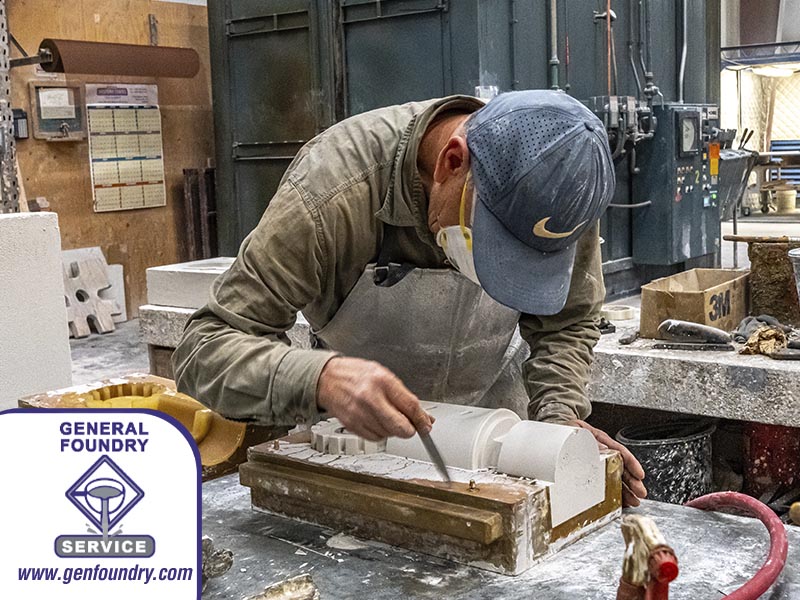
As an engineer, you rely on precision, repeatability, and reliability when specifying manufacturing processes for your designs. Rubber Plaster Mold (RPM) casting is often chosen for producing highly detailed, near-net-shape parts, but many engineers encounter challenges with their current RPM suppliers. If your casting supplier is not delivering castings that meet your expectations, it is time to examine common pitfalls and how to resolve them.
Inconsistent Mold Preparation
One of the most frequent issues in RPM casting stems from inconsistent mold preparation. RPM requires precise plaster-to-water ratios, controlled mixing techniques, and proper curing times. If any of these factors are inconsistent, the molds can crack, deform, or fail under the heat and pressure of molten metal. Engineers must ensure that their foundry follows strict preparation guidelines, uses automated mixing systems, and adheres to precise curing protocols to eliminate variability.
Example Issue: You have designed a complex, thin-walled aluminum housing for a telecommunications device. However, your RPM supplier’s molds keep cracking during casting, leading to production delays and rejected parts. Upon investigation, you discover the foundry has been inconsistently mixing plaster, leading to weak molds.
Solution: You work with the foundry to implement an automated mixing system that maintains an exact water-to-plaster ratio. Additionally, you make slight design modifications, adding small fillets in high-stress areas to reduce stress concentrations. These changes result in stronger molds, improved part yield, and fewer defects.
Surface Defects
Rough textures, porosity, and other surface defects are common complaints from engineers working with RPM foundries. These issues often arise due to poor mold maintenance, improper release agents, or substandard plaster materials. Surface imperfections can lead to additional machining, coating, or rework – driving up costs and slowing production.
Example Issue: You require RPM-cast turbine components with smooth surfaces for optimal aerodynamic performance. However, your casting supplier’s initial castings exhibit pitted surfaces and irregular textures, making them unsuitable for use without extensive finishing. Upon further review, it turns out the foundry has been using a release agent incompatible with the rubber pattern and plaster mold.
Solution: The foundry tests and selects a new release agent that minimizes residue and improves surface quality. You and the supplier also collaborate to implement a light polishing step post-casting, ensuring the final parts meet aerodynamic specifications with minimal additional processing.
Dimensional Inaccuracies
RPM casting can suffer from dimensional inconsistencies due to uncontrolled thermal expansion, shrinkage during curing, or lack of process controls. Tight tolerances are often a requirement for engineered components, and any deviation can lead to assembly issues or functional failures.
Example Issue: Your RPM-cast medical device components are arriving slightly undersized, leading to assembly challenges and compromised performance. After investigating, you find that the foundry has not accounted for shrinkage variability during curing and cooling.
Solution: The casting supplier modifies the tooling that produces the plaster mold to ensure the casting is within tolerance.
Communication Issues
Many engineers experience frustration due to misalignment between their expectations and what their RPM supplier delivers. Vague quality standards, unclear tolerances, and insufficient process documentation can result in costly delays and rework.
Solution: To mitigate these risks, clearly define your quality standards, tolerances, and surface finish expectations from the outset. Engage with your foundry early in the design and prototyping phases to identify potential challenges before they become expensive problems.
Finding the Right Foundry Partner
If your current RPM supplier isn’t meeting expectations, it may be time to explore alternative foundries that prioritize precision, process control, and proactive communication. By partnering with a supplier committed to consistency and quality, such as General Foundry Service, you can ensure that your RPM-cast components meet performance requirements for rapid prototyping or full-scale production.
What Should You Look For in a Foundry Partner?
Process Control & Mold Preparation
- Automated mixing systems: Ensure the foundry uses precise, repeatable plaster-to-water ratios to prevent weak or cracking molds.
- Controlled curing protocols: Look for strict adherence to curing time and environmental conditions to avoid mold deformation or failure.
- Plaster quality assurance: The foundry should source high-grade plaster materials consistently.
Surface Quality Standards
- Proper release agents: Confirm the foundry uses release agents compatible with rubber patterns and plaster molds to reduce surface defects.
- Mold maintenance routines: A disciplined approach to cleaning and maintaining molds prevents rough textures, pitting, or porosity.
- Post-casting finishing options: Ensure the foundry can provide light polishing or surface treatments when necessary to meet performance requirements.
Dimensional Accuracy & Tolerance Management
- Shrinkage compensation processes: Look for foundries that test and account for thermal shrinkage during mold curing and metal cooling.
- Mold preheating practices: Helps ensure dimensional consistency by stabilizing thermal expansion behavior.
- Feedback-informed design collaboration: The foundry should help you refine your CAD models and tolerances based on real-world casting data.
Clear and Proactive Communication
- Defined quality standards and documentation: Choose a foundry that encourages precise specs for tolerances, surface finish, and part performance from the start.
- Early design phase involvement: They should be willing to review designs early and identify potential casting challenges before prototyping.
- Responsive problem-solving: Look for partners who actively engage with issues and offer viable technical solutions quickly.
Commitment to Precision and Reliability
- Repeatable results across batches: Evaluate their track record in delivering consistent quality over multiple production runs.
- Capability for both prototyping and production: Choose a foundry equipped to scale with you, from early design validation to full-scale manufacturing.
- Proven success with complex geometries: Experience with thin-walled, high-detail parts signals process mastery.
How can General Foundry Service help you?
With nearly 80 years of casting experience in various critical industries, General Foundry provides you with “get it right the first time” quality and a genuinely customer-focused approach to each project. We offer best-in-class turnkey solutions with multiple processes and alloy options to meet your component casting needs. Contact us today for more information or to get started on your next project.

